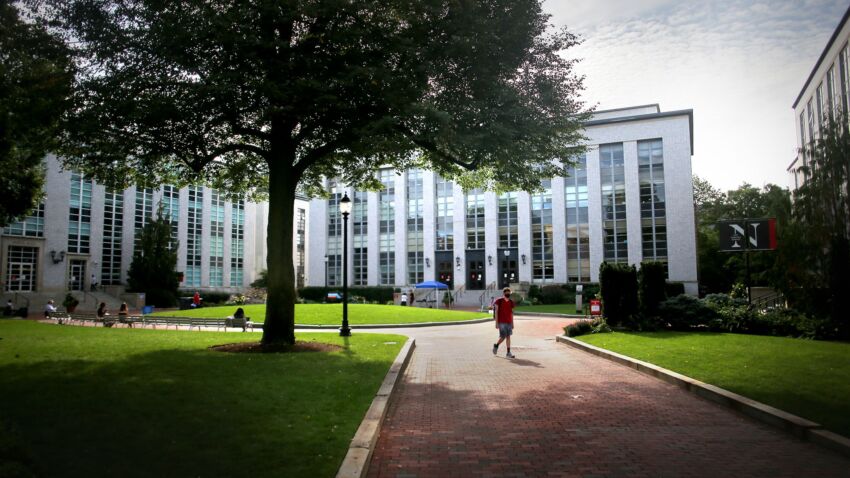Years from now, Emerson College student Joseph Nalieth said he hopes to look back on his “alternative experience” as a freshman living on campus during the coronavirus pandemic and recall memories of just how unique and strange it felt.
“I’m trying to look on the bright side, and to have some good stories about it,” Nalieth said. “It will feel nice to reminisce on this someday, I hope.”
But for now, the theatre education and performance student said he’s just trying to manage what’s felt like a chaotic introduction to college life amid so many changes.
When university students returned to Boston this September, some to begin their academic career and others to finish it, all bets were off the table. With COVID-19 muddying the waters, freshmen no longer could look forward to the extravagant orientation they had always heard about, and seniors were left to replan their final year while searching for the silver linings in hybrid learning.
“The expectation that has kind of been sold to people through pop culture, and all the movies that you watch growing up, is that you feel like that first week of college is gonna be the time that you get to meet like 100 people, and go to these crazy fun orientation events and socialize, probably the most you will maybe in your whole life,” Nalieth said. “A lot of that is reduced because of social distancing regulations, but ultimately I think we’re managing to be social without taking big risks.”
One of the oddest things to get used to, Nalieth said, is not initially knowing what someone’s face looks like until you follow them on Instagram.
“All the restrictions have kind of felt like obstacles to some of the things that we expect for our freshman year of college,” he added.
But when it comes to classes, he noted that the campus’s “One Emerson Flex Learning” setup — which alternates between in-person and virtual class time throughout the week — has made for an easier adjustment to the college workload.
There’s something about a Zoom class, he said, that feels more casual, while the in-person routine helps hold together some semblance of shared community.
“That time that you have in the classroom, it feels like we’re all going through something crazy together and so that kind of adds to it,” Nalieth said. “There are still protocols in place to keep us safe and distanced in our classes.”
To name a few, Emerson’s virus precautions require students to undergo weekly testing, wear a face mask at all times unless in one’s dorm room, complete a daily symptom screening, and stay socially distanced while on or off campus.
With the safeguards the college has put in place, Nalieth said he thinks Emerson has a shot at making it through the whole semester safely, without sending students home.
‘It’s just not the same quality of instruction’
Kelli Small, a senior American Sign Language interpreting major at Northeastern University, is a little more hesitant.
“Given how fast the virus spreads, I don’t know that we’ll all make it through the whole semester in person,” she said. “Me and other students are skeptical, especially once it becomes winter and we’ll start meeting each other indoors.”
Small said she would give the school’s COVID-19 precautions a seven out of 10, noting how the omnipresent cleaning crew that roams the campus at seemingly all hours eases her nerves.
And she said — despite the highly publicized suspension of 11 freshmen last week — most students seem to be adhering to the virus protocols, which require them to be tested every three days, complete a daily wellness check for COVID-19 symptoms, and wear a face mask at all times when on-campus, among other rules.
In some cases, she’s even seen students joking over Twitter about reporting each other when people have their masks off or break the gathering limit in efforts to keep the community accountable.
“I think everybody wants to get their money’s worth and the only way we can do that is if we don’t all get sent home,” Small said. “So I think people are keeping an eye on each other.”
While she’s grateful for what feels like a safe campus environment, it’s been hard to grapple with the financial aspect of the college’s hybrid learning system, “NUflex.”
“There are no good options — like, I hate online learning, [but] in-person learning makes me nervous. [Regardless], I think they should give us a discount for classes that are online because it’s just not the same quality of instruction, and there’s a lot more onus on the students to be sort of self-teaching,” she said. “And why am I giving [NU] $6,000 to teach myself?”
Through the hybrid model, students and professors can choose whether to attend their classes in real time on campus or remotely via Zoom, depending on which setting they’re most comfortable with.
“It’s always been a lot of money, but it seems like a lot more money while you’re sitting at your desk in your own apartment,” Small continued, adding that since this is her last year she’s also had to sacrifice a lot of her senior plans.
One of the biggest reasons she originally enrolled at NU, she said, was for the practical observation program required by her major. In the program, she would get to shadow a real medical interpreter as part of her training.
It would have been a full year in-person placement if it weren’t for COVID-19.
“Now I’m doing it from home,” Small said. “It’s like I waited four years to do it from my desk.”
‘I work better from home’
Aditi Peyush, a fourth-year NU student studying psychology, shared Small’s sentiment on losing valuable senior-year connections, but said she’s trying to make the best of the situation.
“I prefer working from home. I work better from home. I have ADD, and it’s nice to be able to jump from one assignment to another to another and have that flexibility,” she said. “I think a lot of people really downplay that. It’s nice to be able to get up in the middle of your lecture and get a snack from the kitchen.”
Peyush is currently working as a co-op for a political campaign finance reform organization, which extended her position until the election cycle, offering her the opportunity to intern while going to school.
“I’m really excited about it because I get to do everything that I want to do and I wouldn’t be capable of doing it if I had to go to class in-person,” she said.
Echoing Small, Peyush said NU’s precautions feel safe, but human behavior is worrying.
“A lot of the responsibilities lie on the students and from what I’ve seen, a lot of them aren’t taking it very seriously, so that’s what concerns me,” she said. “A lot of people feel like they can’t hear anyone else when they’re wearing a mask so they will wear it on one ear, or they’ll like have it on their neck, or they won’t wear one at all when they’re in groups, which I think is just not okay.”
‘It’s just all very distracting’
A freshman theatre and performance major at Emerson, Claudia Whitehead said she’s noticed that juniors and seniors are tending to take the virus more seriously than underclassmen.
“I think the freshmen don’t really understand that we could go home because they didn’t live through it the first time,” Whitehead said. “Also as a freshman, you’re trying really hard to make friends so I think that kind of impacts people and they’re less likely to take it seriously because they just want that freshman college experience so badly.”
Whitehead said even the littlest things make that first-year experience feel lonelier, like not having a roommate to confide in, not being able to stop by her friend’s dorm for a late night conversation, or not being able to tell when people are smiling at you in the hallways.
“I hate having to wear a mask everywhere and having to get tested all the time,” she said. “It’s good that we have to, but it’s so hard to get to know people when you’re yelling at them through your mask.”
Classes, Whitehead added, come with their own set of concerns.
“I’m not really focusing on the class when I’m in-person because I’m nervous that we’re in such a small space, and then I’m nervous to be there anyway, and we’re all spaced out and there’s plexiglass,” she said. “It’s just all very distracting.”
Despite the downfalls, Whitehead said she’s glad to have had the option to be on campus at all. During her first few days in the city she felt homesick and wished she could see her mom, but now that she’s settled she just hopes she doesn’t have to pack up mid-semester.
“I’m really glad that we had the opportunity,” she said, “and I really hope that we get to stay.”
Get Boston.com’s e-mail alerts:
Sign up and receive coronavirus news and breaking updates, from our newsroom to your inbox.


















